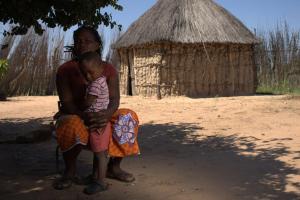Namibia: Eliminating mother-to-child transmission of HIV and hepatitis B
Windhoek ‒ Aazehe Tjozongoro was devastated when she tested HIV positive during her first pregnancy, even contemplating suicide because she felt so desperate. Seven years later, however, her child is HIV-negative, and they are both living a healthy life, thanks to Namibia’s commitment to building a generation free of the triple public health threats of HIV, hepatitis B and syphilis.
“Namibia’s milestone achievements reflect a deep commitment by the country to protect the lives of women and children.” Dr Richard Banda, WHO Representative in Namibia
“The nurses told me what medication to take, and I followed their instructions carefully, taking my medication at the same time as I gave my baby. I now have four children, all of whom are HIV-negative, and I feel very good,” says Tjozongoro, of Opuwo, the capital of Kunene Region in the north-west of Namibia.
Tjozongoro’s story is not unique in the country, where, annually, 12 000 women living with HIV give birth and 96% of their babies are born HIV-free. Increased access to HIV treatment and services has led to a 70% reduction of mother-to-child transmission of HIV in the last 20 years.
In May 2024, World Health Organization (WHO) certified Namibia as having reached “silver tier” status for progress in reducing mother-to-child transmission of HIV. The country also attained a “bronze tier” status on the path to ending transmission of hepatitis B from mother to child. Among other factors, WHO certifies a country as having attained silver tier status when the hepatitis B vaccine is given to 50% or more newborn babies. Bronze certification is awarded to countries which have reduced the vertical transmission of HIV from mother to child to less than 5%.
“It is so gratifying to note that after 22 years of concerted effort, we have now come to the situation where World Health Organization has recognized that Namibia is on the path to elimination of mother-to-child transmission of HIV and hepatitis B,” says Dr Kalumbi Shangula, Namibia’s Minister of Health.
This landmark achievement reflects the country’s concerted strategy to curb transmission of HIV, hepatitis B and syphilis, as part of a broader health and development agenda, integrating primary health care with antenatal, child health and sexual and reproductive health services. The government also committed stable domestic finance to national health programmes, offering widely accessible, high-quality patient-centred and free clinical services and support.
“I now have four children, all of whom are HIV-negative, and I feel very good.” Aazehe Tjozongoro, woman living with HIV
Hilia Sam, a registered nurse at Opuwo Clinic, explains that all pregnant women are tested for HIV. If they test positive, they are immediately enrolled in the prevention of mother-to-child transmission of HIV (PMTCT) programme. A combination of HIV treatment and counselling follows, continuing after women give birth.
“We offer prophylaxis to HIV-exposed babies that are breastfeeding until mothers stop breastfeeding at 18 months, but this continues if women are still breastfeeding after that age,” Sam says.
Community cooperation is key, with dedicated community adherence groups ensuring timely access to medication for people living with HIV. “People come together to form groups of between five to 15 members. They then take turns to go and get everyone’s medication and are only seen once a year by clinicians who also screen them for tuberculosis and other related conditions,” says Nomagugu Ndebele, Comprehensive Senior Health Programme Officer in Kavango West region.
One of the primary aims of these groups is to raise awareness around PMTCT, which is easier to achieve in small groups, where members can ask questions, seek advice and support one another, she adds.
WHO has been providing guidance to countries regarding initiation of PMTCT programmes and their sustainability. Similarly, in 2002, Namibia government introduced the government funded PMTCT programme. In 2014, the first National Elimination Strategy was initiated, followed by the National Roadmap to Elimination of HIV and syphilis in 2020, with viral hepatitis B interventions added later. WHO also supported the country to establish a multisectoral National Validation Committee for elimination of the three diseases.
“Namibia’s milestone achievements reflect a deep commitment by the country to protect the lives of women and children, and we, as WHO, are proud to have played a role. Going forward, we remain fully committed to supporting the country in every way possible towards the goal of eliminating mother-to-child transmission of HIV, hepatitis B and syphilis,” says Dr Richard Banda, WHO Representative in Namibia.
Communication Officer
WHO Regional Office for Africa
Email: ridgardn [at] who.int (ridgardn[at]who[dot]int)
Tel: +254 11 289 0666
Communications and marketing officer
Tel: + 242 06 520 65 65 (WhatsApp)
Email: boakyeagyemangc [at] who.int (boakyeagyemangc[at]who[dot]int)
